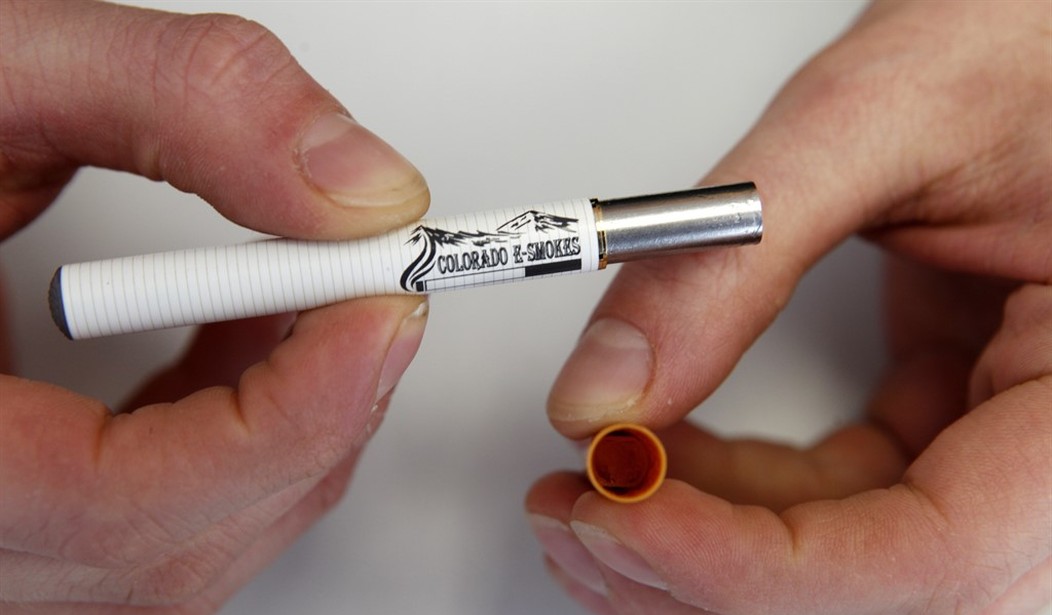The Food and Drug Administration this week came out with regulations that will force e-cigarette and vaping manufacturers to go through the same onerous process to qualify what they sell as "tobacco products" - despite not having one iota of tobacco involved.
There's only one conclusion to draw here: the FDA doesn't care about public health.
"Vaping" is seen by government health nannies as yet another sinful behavior that irresponsible Americans are participating in when they could be eating kale salads instead. But that takes a fundamentally misguided point of view on the subject. What vaping really constitutes is a tobacco alternative that has enabled millions of smokers to wean themselves off of a harmful habit.
The new FDA regulations will require vaping companies to complete application requirements that will take more than 5,000 hours to complete and will cost over $300,000 for each product, according to the Wall Street Journal. This is incredibly onerous for smaller vaping companies – the exact ones that have pioneered the radical innovation and competition and allowed the industry to flourish – while giving the huge tobacco companies a leg up for their own vape products. (Not to mention that smaller numbers of vapers likely means larger numbers of smokers of traditional tobacco products.)
The right way to think of vaping is as a quitting mechanism. Yes, in a vacuum, vaping is more harmful than complete abstinence. But studies have shown - over and over again - that it's much less harmful than smoking traditional tobacco products. Many have been able to make the transition away from smoking tobacco to vaping, and to good results.
Recommended
Indeed, the new FDA regulations fly in the face of a report out of the U.K. Last week. The study suggested, explicitly, that tobacco users switch to vaping products in order to reduce the harm to themselves.
The Royal College of Physicians reviewed the literature on the potential costs and benefits of vaping, and came to a conclusion that the FDA would have been wise to heed. “The RCP believes that e-cigarettes could lead to significant falls in the prevalence of smoking.. prevent many deaths and episodes of serious illness, and help to reduce the social inequalities in health that tobacco smoking currently exacerbates.”
Anecdotally, I've seen this to be the case. I know friends who tried to quit smoking for years, using all different kinds of methods – therapy, patches, gum, everything available – but were only able to succeed at quitting when they were able to make the switch to e-cigarettes.
What the nannies and the neo-prohibitionists at the FDA are concerned about is people picking up vaping out of the blue. That perhaps there's a teenager who doesn't smoke and would never smoke who picks up vaping, which is on net potentially more unhealthy than doing nothing. Indeed, vaping is on the rise among teenagers, even among those who don't smoke.
The only problem with this concern is that there's no data to support it. As the New York Times wrote, “worries about [vaping] – including that using them will lead young people to eventually start smoking traditional cigarettes — have not come to pass.”
The FDA as an organization has consistently erred on the side of caution and a harmful status quo. From slow-rolling drug approval to the urge to regulate first, the FDA sees itself not as merely an
The FDA's alarmism is unfortunately going to push more people into smoking rather than letting this encouraging trend to continue. Unfortunately for Americans, the health nannies at the FDA take a regulate-first ask-questions-later approach, specifically refusing to focus on the good of harm reduction that the vaping habit has enabled. The FDA thinks that the choice is between vaping and nothing, when what's actually happening is that the FDA is choosing smoking over vaping.

























Join the conversation as a VIP Member